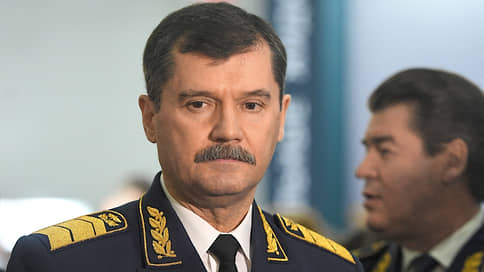Alexander Neradko, who headed the Federal Air Transport Agency for 14 years, was dismissed
[ad_1]

Alexander Neradko, who led the Federal Air Transport Agency for almost 14 years, was replaced by a young deputy, Dmitry Yadrov, who oversaw unmanned projects in the service. Kommersant’s sources attribute the reshuffle to Mr. Neradko’s difficult relationship with the leadership of the Ministry of Transport, which was aggravated by the high degree of independence of the Federal Air Transport Agency, through which the bulk of budgetary funding for the industry passed. Other reasons were the service’s insufficient readiness for the development of the unmanned industry, as well as its inability to fully replace the IAC in matters of equipment certification and accident investigation.
Prime Minister Mikhail Mishustin September 15 appointed 35-year-old Dmitry Yadrov is the new head of the Federal Air Transport Agency (Rosaviation). Mr. Yadrov, who previously held the post of deputy head of the service, has been working at the Federal Air Transport Agency since 2019 and, as the Ministry of Transport clarified, “oversaw the implementation of the most important sectoral federal projects,” including the development of unmanned aircraft systems.
The former head of the Federal Air Transport Agency, 62-year-old Alexander Neradko, who oversaw the industry for 14 years, was dismissed; his new place of work is still unknown.
Kommersant’s sources in the industry associate his departure with many years of tense relations with the head of the Ministry of Transport, Vitaly Savelyev, and the accumulated critical mass of complaints. Among the latter is the government’s dissatisfaction with the progress of integrating drones into a single airspace.
At spring conferences and meetings in Rudnevo (where the Moscow cluster for the production of drones is located), both President Vladimir Putin and First Deputy Prime Minister Andrei Belousov made it clear that if Rosaviation does not cope with the issues of integration and development of the regulatory framework, which “has been sluggishly written since 2018 year,” “the issue can be delegated to other persons,” says one of Kommersant’s interlocutors.
Rumors about the resignation of Alexander Neradko were raised regularly in the aviation industry and intensified in 2022 amid corruption scandals with ex-service officials. In May 2022, Prime Minister Mikhail Mishustin issued an official reprimand to Alexander Neradko “for failure to fulfill the instructions” of Vitaly Savelyev: according to Kommersant’s interlocutors, the conflict was long-standing and escalated into confrontation after the transfer of Mr. Savelyev and his deputy at Aeroflot Igor Chalik to the Ministry of Transport in 2020.
The Federal Air Transport Agency under Alexander Neradko was too independent – it is through it that budget subsidies for air transportation are distributed, as well as large funds for the construction of airfields and air navigation systems. “The Ministry of Transport wanted to install its own man – and, obviously, got him in the person of a young specialist,” argues one of Kommersant’s sources, calling Mr. Yadrov a compromise figure.
Another conflict was related to the idea of mandatory transfer of Russian aircraft to the domestic register, which until 2022 caused resistance from most carriers.
“Everyone was against it because Rosaviation did nothing to ensure that its register complied with international standards,” says one of the top managers of a large airline. “And the general transition from hopelessness after 2022 does not mean that Rosaviation was able to develop standards.”
Another subject of criticism was the inability of the Federal Air Transport Agency to perform the functions of the Interstate Aviation Committee (IAC) in the field of aircraft certification, and later in the investigation of accidents.
Alexander Neradko was the main apologist for the weakening of the IAC in favor of the Federal Air Transport Agency. But although the government transmitted IAC certification powers back in 2015; in fact, the functions of the IAC Aviation Register and the Russian Aviation Register were duplicated. The Federal Air Transport Agency has not been able to form a full-fledged staff of specialists, and the regulatory framework remains crude, Kommersant’s sources say. The investigation of accidents still remains the responsibility of the IAC, although work on creating a “backup” – the “International Bureau for the Investigation of Aircraft Accidents and Serious Incidents” – has been announced by the Ministry of Transport since 2018. From this point of view, this week’s emergency landing of a Ural Airlines plane in a field (the second in recent years) could become an additional argument in favor of Mr. Neradko’s resignation. “The regulator is responsible for flight safety, for monitoring the training of pilots,” notes a Kommersant source.
Among the achievements of Alexander Neradko, Kommersant’s interlocutors name the preparation of 11 airports for the 2014 Olympics and the 2018 FIFA World Cup, projects for the reconstruction of airports and the modernization of the unified air traffic management system (EU ATM). The reconstruction of the airport network was indeed a large-scale project, notes Oleg Panteleev, executive director of the Airport, “although it was not without delays and it is impossible to talk about ideal execution.” The modernization of the air navigation system is an absolute achievement, the expert agrees: “For its time it was a breakthrough.”
Mr. Panteleev associates the change in the leadership of the Federal Air Transport Agency with the priority of developing unmanned aircraft. After the turn towards drones was outlined by the state at the highest level, and their integration into the airspace became one of the obvious problems, Rosaviatsia and the ATM State Committee subordinate to it were called the weak link. Against this background, Oleg Panteleev believes, the appointment of Dmitry Yadrov, “young, progressive and dedicated to the topic of unmanned aerial vehicles,” looks logical.
[ad_2]
Source link





